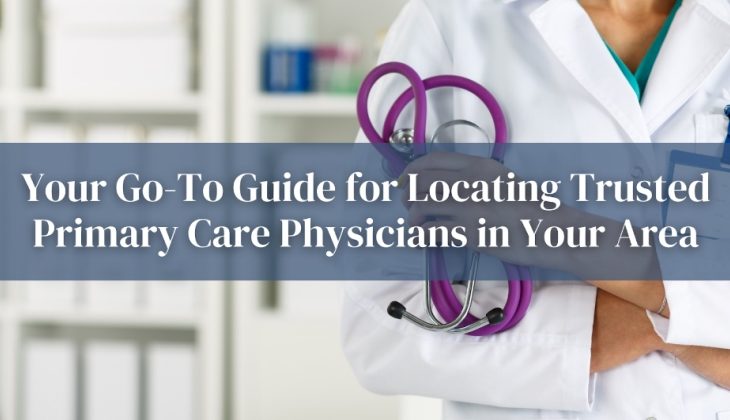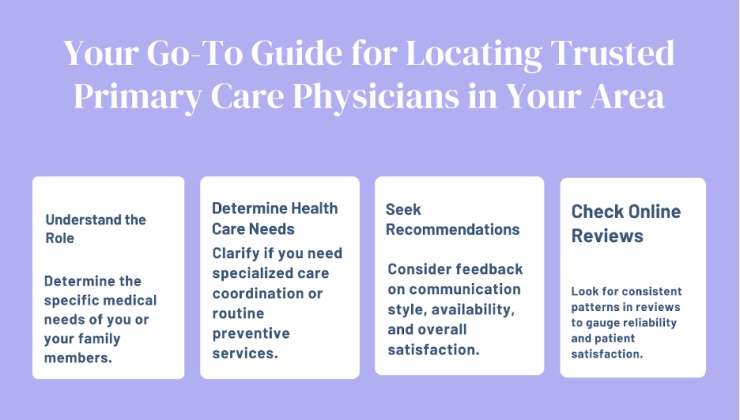Your Go-To Guide for Locating Trusted Primary Care Physicians in Your Area

Being sick nowadays has been a challenge for people, and having someone that will care for you will allow you to be at ease despite being sick. Having a regular doctor is one of the best things for your health or overall wellness.
APCP goes way beyond being simply a doctor as they are your health shepherds who will help you understand medical procedures and treatments and ensure that you find the right people or facilities to take care of you and ensure continuity in your care.
It is crucial to choose a PCP who is trustworthy and has excellent communication skills, as they play a vital role in your healthcare. Below are some tips to help you identify a qualified primary healthcare physician in your area.
1. Understand the Role of a Primary Care Physician
Primary care physicians are generalists in nature and can treat any condition. They are typically categorized into:
Family Medicine Physicians: Specialize in the treatment of both young children and adult patients.
Internal Medicine Physicians (Internists): Focus on promoting adult health, diagnosing, and treating diseases and other health issues.
Pediatricians: Specialize in the health of children.
Geriatricians: Focus on hard-to-place patients such as the elderly.
Obstetricians/Gynecologists (OB/GYNs): They are usually PCPs for women and therefore have the highest control in managing reproductive health.
Understanding these categories can help you identify which type of PCP is most suited to your needs.
2. Determine Your Health Care Needs
Before you begin to look for a healthcare strategy, identify your specific healthcare needs. Consider the following factors:
Age and Gender: Do you need a pediatrician for your child or a geriatrician for your elderly parent?
Chronic Conditions: Are there any acute and chronic diseases that require regular monitoring?
Preventive Care: Do you want a physician who will recommend ways of taking preventive measures and healthy living practices?
Specialized Care: Do you need a PCP who is capable of close collaboration with other health professionals for the treatment of complex cases?
Identifying what type of health issues you will need to be dealt with by your PCP will make it easier for you to figure out what sort of provider best suits your needs.
3. Start Your Search: Recommendations and Reviews
Personal Recommendations
The products provide an opportunity for businesses to satisfy this need while at the same time marketing themselves as eco-friendly business entities. The consideration of the values held by the consumers, such as their preference for eco-friendly options and services, and primary care doctors near me, is beneficial for boosting sales and creating loyalty amongst the consumers.

4. Verify Credentials and Experience
Another task is to check the information about the chosen PCPs to confirm they are eligible and experienced.
Board Certification
Ensure the physician is board-certified. Certification means the doctor has received additional training and passed a test to practice in their chosen field. You can verify the certificate through ABMS for AMB’s certification.
Licensing
Check to ensure the doctor is licensed and is eligible to operate in your state. It is highly advisable to check this information on the medical board of your state.
Experience
A hospital is about the Quality of care that is provided to the patients and the experience of the doctor depending on the condition that you need. Older physicians have explored more complicated cases and likely developed a more substantial knowledge of how to address them.
5. Consider Accessibility and Convenience
Location
Choose a PCP whose office is centrally located for your convenience. This will make it easier to attend regular and follow-up appointments. Think of how far your home, your office, or any other place is that you can commute to.
Office Hours
See the time at which the tutors are availed in the office to avoid inconvenience. Most physicians require that patients must be available at a particular time and this may be during your work time and this may not be preferable for you.
Availability
Ask about the doctor and whether appointments can be made for them. Others may have long waits for a new appointment, which would not work well if you need care sooner rather than later. Finally, inquire if the doctor can see emergency patients on the same day.
Hospital Affiliations
It also will be helpful to determine the list of the hospitals to which the doctor is affiliated. This is important in case you are hospitalized as it is important to know the kind of hospital that is near you where the PCP is registered and can be able to take care of you during admission.
Conclusion
It is not so easy to entrust your health to a primary care doctor, but when you do, it’s worth the effort. A good PCP will act as your health partner, guiding you through medical devices, healthcare services, and other health-related information and needs. By going through this guideline you can make an educated decision and locate a PCP that is satisfactory and reliable.
Remember that your health is your most important possession; choose the best primary care physician for your needs.
FAQs
1. Why is it important to choose a trusted primary care physician?
A trusted primary care physician ensures continuity of care, provides comprehensive health management, and serves as your health advocate.
2. How can I find a reliable primary care physician in my area?
Start by seeking recommendations from friends, family, and current healthcare providers, checking online reviews, and verifying credentials and experience through professional medical boards.
3. What factors should I consider when selecting a primary care physician?
Consider the doctor’s communication style, office location, availability, compatibility with your health insurance, and approach to preventive care and patient involvement.







